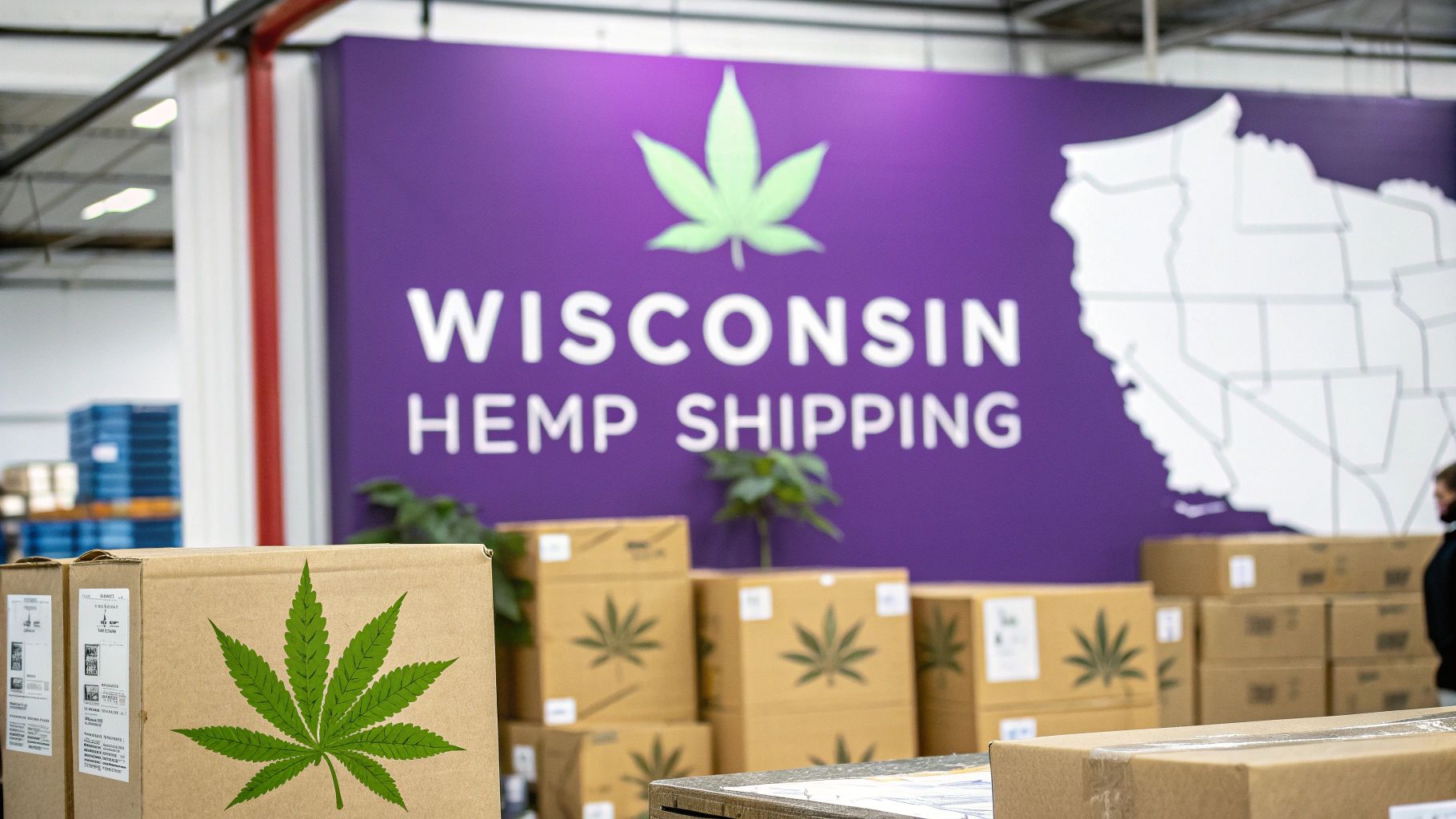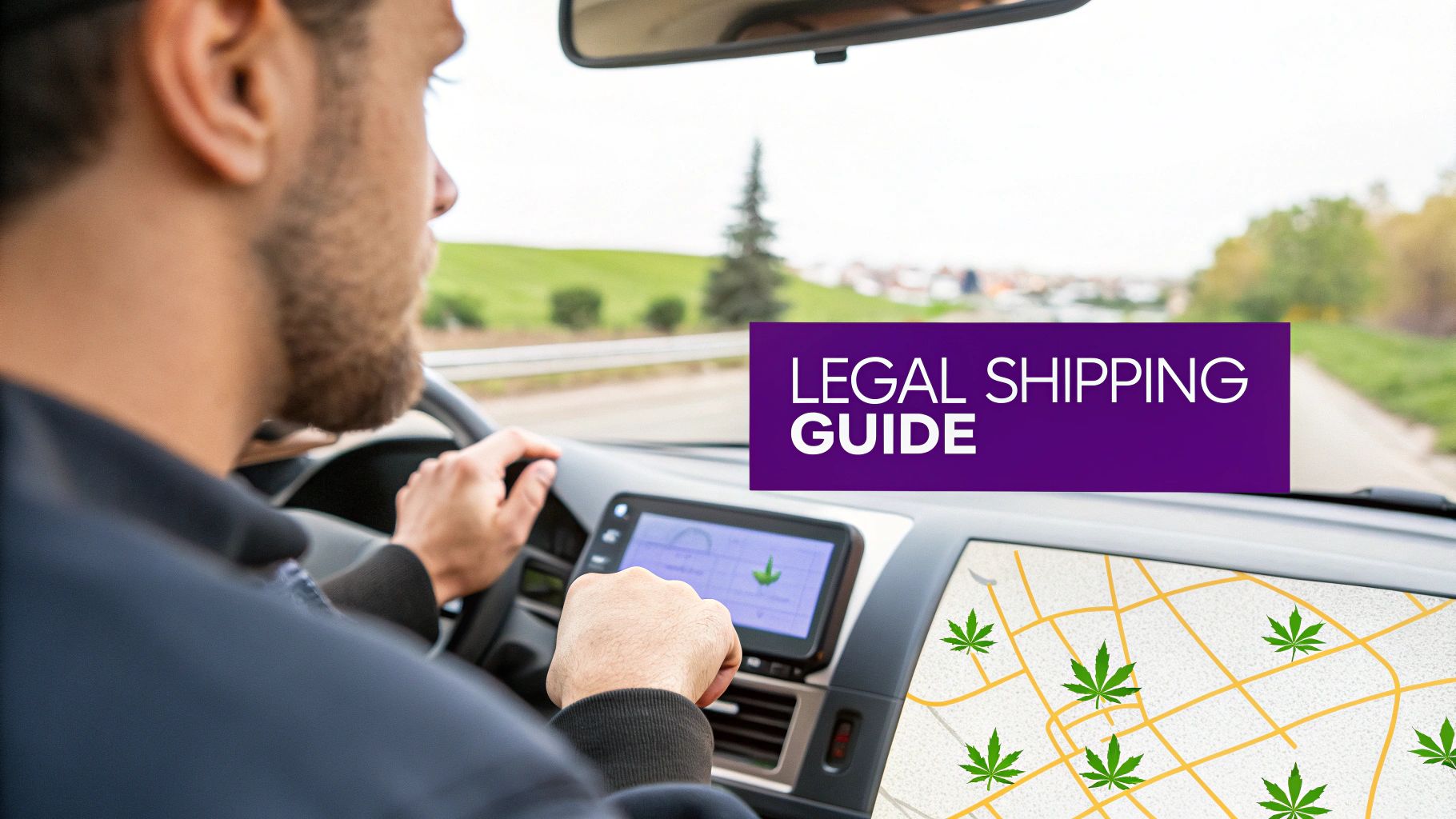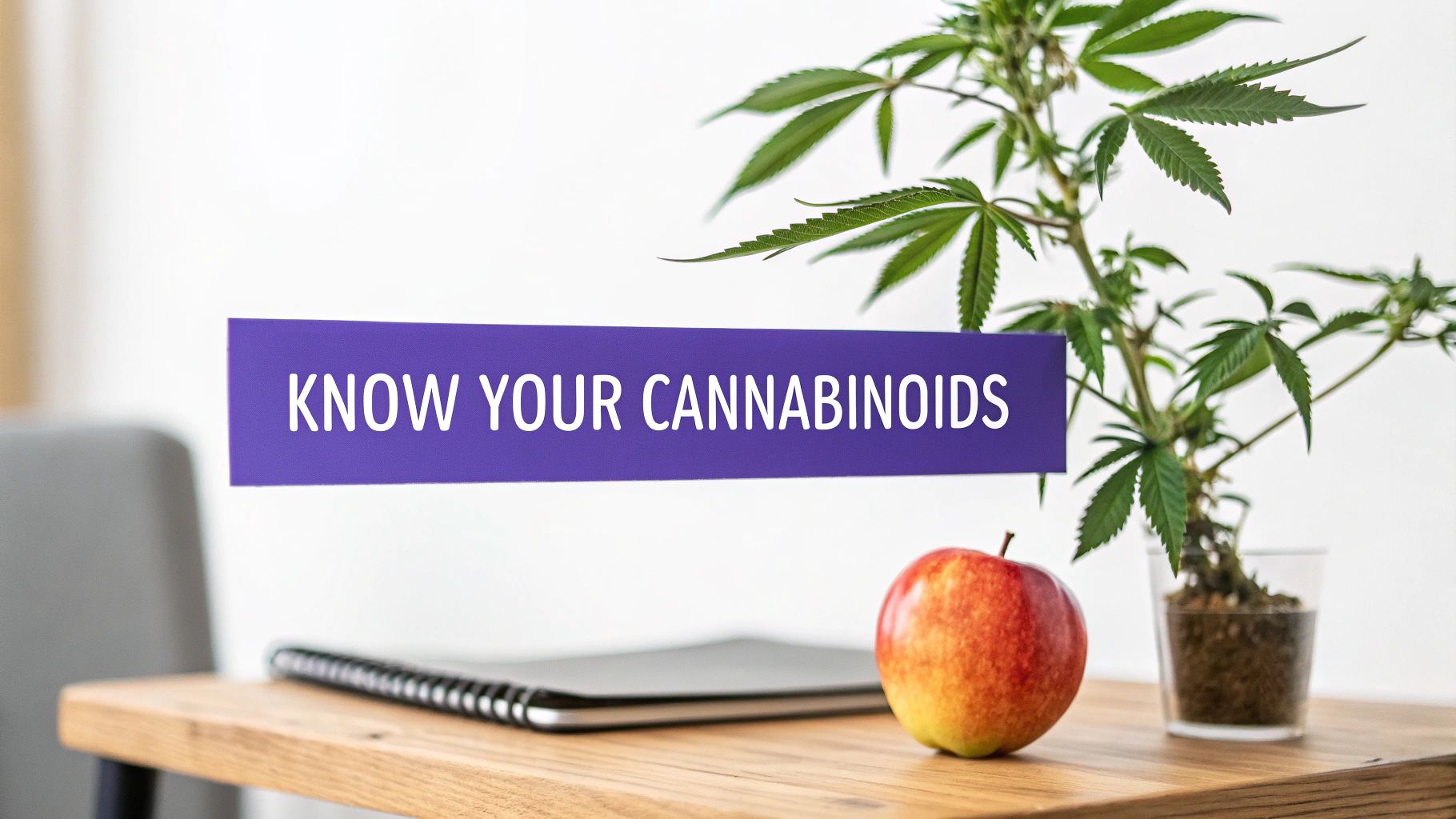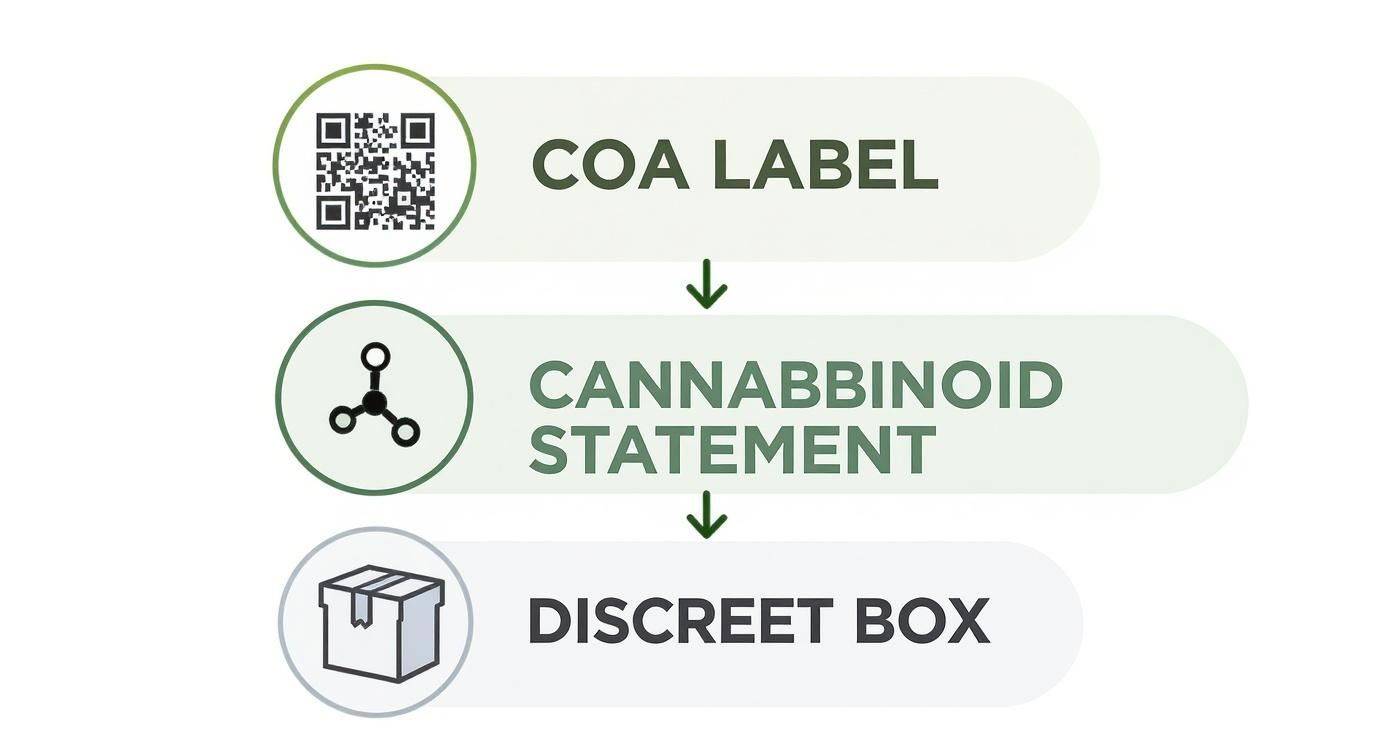
CBD/Hemp/THCA Shipping Laws Wisconsin: What You Need to Know
CBD/Hemp/THCA Shipping Laws Wisconsin: Learn what's allowed, banned, and how to ship legally and safely.
Cody Y.
Updated on Oct 29, 2025
When it comes to shipping CBD, hemp, or THCA products to Wisconsin, it’s easy to get bogged down in the details. But here’s the bottom line: it all hinges on federal compliance. If your product is derived from hemp and contains less than 0.3% Delta-9 THC by dry weight, it's generally good to go in the Badger State, thanks to the 2018 Farm Bill.
The Legal Maze of Shipping Hemp in Wisconsin

Think of shipping hemp into Wisconsin like driving on the interstate system. The federal 2018 Farm Bill is the main highway—a wide-open road that made hemp legal across the country. This is the fundamental reason you can ship compliant CBD, hemp, and even certain THCA products across state lines without much fuss.
But just like driving, you have to watch out for local rules. While Wisconsin sticks to the federal highway, individual cities or counties can throw up their own stop signs or detours. These might look like specific age verification rules or local sales restrictions that can complicate that last mile of delivery.
Differentiating Your Cargo
It also really matters what you're shipping. Think of your products as different types of cargo:
- CBD Products: These are like standard, everyday packages. Carriers and authorities know what they are and are comfortable handling them, as long as they stay under the THC limit.
- THCA Products: This is more like sensitive, specialized freight. Even though it's federally compliant, the fact that THCA turns into psychoactive Delta-9 THC with heat puts it in a legal gray area. This demands extra diligence and crystal-clear documentation.
Getting this distinction right is everything. To ship successfully, you have to know both the broad federal rules and the specific nuances of the product you’re putting in the box.
The heart of Wisconsin's hemp policy is its direct alignment with federal law. After the 2018 Farm Bill passed, the state streamlined its own program, eventually doing away with state-specific hemp licenses and deferring to federal oversight. This simplifies things quite a bit for businesses already following federal rules.
This shift means that while the state doesn't pile on extra regulations, the responsibility to prove your product's legality falls squarely on you, the shipper. You need to be ready to show, without a doubt, that what you're shipping is legal hemp. For a deeper dive into these foundational rules, take a look at our guide on general hemp shipping rules and restrictions.
Ultimately, shipping into Wisconsin without headaches comes down to meticulous records and clear communication. And it’s not just about the law—mastering the best practices for contract management is key to building solid relationships with your partners and carriers in this fast-moving industry.
Wisconsin Cannabinoid Shipping Status At-a-Glance
To make things even clearer, here’s a quick summary of where things stand for shipping major cannabinoids to Wisconsin.
| Cannabinoid | Legal Status in Wisconsin | General Shipping Guidelines |
|---|---|---|
| CBD | Legal | Permitted to ship as long as it's hemp-derived and contains less than 0.3% Delta-9 THC. |
| Delta-8 THC | Legal (Gray Area) | Generally considered legal under state law, but its status is debated. Ship with clear COAs. |
| Delta-9 THC | Illegal (if > 0.3%) | Products exceeding the 0.3% Delta-9 THC threshold are considered marijuana and are illegal to ship. |
| THCA | Legal (Gray Area) | Federally compliant, but its potential to convert to Delta-9 THC means you need immaculate documentation. |
This table gives you a snapshot, but remember that the legal landscape can shift. Always stay on top of the latest federal and state guidelines to ensure every shipment is compliant.
Understanding What You Are Actually Shipping

When you're trying to navigate CBD, hemp, and THCA shipping laws in Wisconsin, the terminology can feel like a minefield. Lots of people use these terms interchangeably, but when it comes to legal compliance, the differences are everything.
Misunderstanding what you're actually shipping is one of the fastest ways to get unwanted attention from carriers or law enforcement.
Think of it this way: the entire hemp plant is like one big apple tree. That tree is legally classified as hemp as long as it contains less than 0.3% Delta-9 THC by dry weight. That number is the single most important metric in both federal and Wisconsin state law. The tree itself is legal, but it can grow a lot of different kinds of "apples"—and those apples are the various cannabinoids.
Distinguishing the Cannabinoids in Your Shipment
CBD is like a common, everyday apple from that tree. It's widely known, legal everywhere, and doesn't get you "high." Carriers are generally comfortable shipping it, as long as you have the paperwork to prove it came from a compliant hemp tree.
THCA, on the other hand, is a very different kind of apple. When it's raw and unheated, it's non-psychoactive, just like CBD. But if you "bake" it—meaning you apply heat by smoking, vaping, or cooking—it undergoes a chemical change called decarboxylation and turns into intoxicating Delta-9 THC. It’s this potential to convert that puts THCA in a legal gray area and demands much stricter documentation.
The core principle is simple: your product is legally defined by its Delta-9 THC concentration, not its THCA content. A product rich in THCA can still be classified as legal hemp, but only if its Delta-9 THC level remains below the 0.3% threshold.
This isn't just an academic distinction; it's the absolute foundation of your shipping strategy. That Certificate of Analysis (COA) isn't just a piece of paper—it’s your official proof that your "THCA apple" hasn't turned into a federally regulated substance. Understanding this allows you to classify your products correctly, manage risk, and stay compliant.
For a deeper dive into how these legal definitions shake out in the real world of shipping, check out our guide on the critical shipping law differences between hemp and marijuana products.
Why the Source and Form Matter
At the end of the day, it doesn't matter if you're shipping oil, flower, or edibles. The legal status always comes down to two key questions:
- Is it derived from hemp? The product must come from a legally cultivated hemp plant.
- What is its Delta-9 THC level? The COA must prove it's at or below 0.3% by dry weight.
Every other cannabinoid, including THCA, is secondary to that one critical number. As long as you focus on the Delta-9 THC content, you can confidently figure out whether your product meets Wisconsin's legal requirements for shipping.
How Local City Rules Change Your Shipping Strategy
When you’re shipping CBD, Hemp, or THCA products in Wisconsin, it’s easy to think you’re in the clear once you’ve checked the federal and state boxes. But that’s a dangerous assumption. While the state generally sticks to the 2018 Farm Bill, individual cities and counties are flexing their authority, creating another critical layer of rules you can’t afford to ignore.
Think of it this way: federal law is the main highway, and Wisconsin’s state law is the major interstate running through it. But once you take an exit into a city like Milwaukee or Madison, you’re on their streets. You have to follow their local signs and speed limits. Ignoring a city ordinance can land you in just as much trouble as breaking a federal rule.
This patchwork of local regulations means that a product perfectly legal to deliver in one part of Wisconsin might face extra restrictions just a few miles down the road.
Milwaukee Sets a Precedent for Local Control
A perfect example of this is unfolding right now in Milwaukee. Starting in 2025, the city is rolling out specific age restrictions for selling intoxicating hemp products, which includes Delta-8 and other psychoactive cannabinoids. This local ordinance demands that all vendors verify customers are 21 or older before any sale is made. You can get more details on Milwaukee's local compliance measures over at cannabisregulations.ai.
This move by a major Wisconsin city sends a clear signal: municipalities aren't waiting for the state to clear up gray areas. For any online seller shipping into Wisconsin, this is a game-changer. It pushes robust age verification from a "nice-to-have" feature to an absolute must-have compliance tool.
Adapting Your eCommerce Strategy for Local Rules
To keep your business safe, you have to use technology that can manage this level of granular control. A one-size-fits-all shipping policy for Wisconsin just won’t cut it anymore.
You need tools that can apply rules based on a customer's specific delivery address, not just their state. This is where modern compliance software becomes indispensable for any serious eCommerce operation. To really grasp the bigger picture, it’s worth reading up on county-level shipping restrictions and why state compliance isn't enough.
The takeaway is simple: just because a product is legal at the state level doesn’t mean you have unrestricted access to every market within it. Local ordinances can—and will—dictate how and to whom you can sell, directly impacting your last-mile delivery and your entire shipping workflow.
Failing to account for these local rules can lead to painful consequences, from returned shipments and angry customers to potential legal action from city authorities. True compliance means treating every city as its own regulatory zone. Your shipping strategy has to be nimble and precise enough to adapt to this messy and constantly shifting legal landscape.
Packaging Your Products for Safe and Legal Transit
Proper packaging and labeling are your product’s passport for getting through the shipping system without a hitch. Think of it like this: each package needs to be sealed, documented, and clearly defined to cross state lines without getting flagged, seized, or stuck in transit. For anyone serious about following CBD, hemp, and THCA shipping laws in Wisconsin, getting this right is non-negotiable.
You really have two main goals here: be completely transparent about the product’s legality while keeping the outside of the box discreet. The inner product label has to be an open book, spelling out all the required legal info. The outer shipping box, however, should be as plain as possible, giving no clue about what’s inside. This simple strategy helps prevent theft and avoids unnecessary attention from carriers or law enforcement who might not know the difference between legal hemp and marijuana.
Crafting the Perfect Label
Your product label is your first line of defense. It needs specific, easily verifiable information that instantly proves your product is legal. A vague or incomplete label is a huge red flag that can stop a shipment in its tracks.
Make sure every label includes these core elements:
- Clear Cannabinoid Content: State the exact concentration of all major cannabinoids, especially the Delta-9 THC level, to prove it’s under the 0.3% federal limit.
- A Scannable QR Code: This is critical. The code must link directly to the product's third-party Certificate of Analysis (COA) for immediate proof of compliance.
- Required Disclaimers: Include all necessary warnings and statements required by federal guidelines, like age restrictions or health disclaimers.
- Batch or Lot Number: This detail connects the specific product to its COA, creating a clear trail for traceability and accountability.
Think of the QR code as an instant background check for your product. A curious postal worker or official can scan it, see the lab results in seconds, and have their questions answered on the spot. Without it, your package is just a suspicious box waiting for a reason to be opened.
The Art of Discreet Outer Packaging
While your inner label is all about compliance, your outer packaging should be all about anonymity. The goal is to blend in with the millions of other packages moving through the shipping network every day.
A plain brown box is your best friend. Avoid any branding, logos, or words like "hemp," "CBD," or "cannabis" on the exterior. This simple step is one of the most effective ways to protect your shipment from theft and unwarranted inspections.
It’s also a smart move to use odor-proof bags or containers inside the box, particularly for hemp flower. The smell of hemp is distinct from marijuana, but not everyone knows the difference, and any confusion can lead to major headaches. Sealing the product properly ensures it arrives without attracting the wrong kind of attention.
By mastering both transparent labeling and discreet packaging, you create a shipment that’s legally solid, secure, and ready for a smooth journey to your customer in Wisconsin.
Choosing the Right Shipping Carrier for Hemp
Picking a shipping carrier for your hemp products isn't just about finding the best rate; it's a massive compliance decision. You need to understand that not all major carriers see hemp the same way. In fact, their internal policies can be far stricter than the actual law. Choosing the wrong shipping partner can lead to disaster: seized packages, a suspended account, and a complete shutdown of your fulfillment operations.
It helps to think of USPS, UPS, and FedEx as having different personalities when it comes to risk. The United States Postal Service (USPS), being a federal agency, generally keeps its policies in line with federal law. This often makes it the most straightforward and dependable choice for shipping compliant hemp products, provided you have all your paperwork ready to go.
Private carriers like UPS and FedEx are a different story. They operate under their own terms of service and are much more risk-averse. This caution leads them to impose extra requirements or, in some cases, outright refuse certain hemp products—especially anything containing THCA.
Navigating Carrier-Specific Rules
Every carrier has its own unique rulebook, and you have to follow it to the letter. One slip-up can get your shipment flagged and your business blacklisted. For anyone navigating CBD, hemp, and THCA shipping laws in Wisconsin, knowing these differences is absolutely essential.
No matter who you ship with, you'll need a core set of documents on hand:
- Certificate of Analysis (COA): This is your golden ticket and is completely non-negotiable. It's the primary proof that your product's Delta-9 THC level is safely under the legal 0.3% threshold.
- Business Licensing: Private carriers like UPS and FedEx will likely want to see proof of a valid business license before they agree to ship any hemp products for you.
- Signed Attestations: Be prepared to sign a formal statement confirming your shipment follows every single federal, state, and local law.
This infographic breaks down the essential packaging compliance steps you need to take before your package even makes it to the carrier.

As the visual shows, a compliant package always starts with a clear link to the COA, a detailed cannabinoid statement, and discreet outer packaging that doesn't advertise its contents.
Comparing Major Carrier Policies for Hemp Shipping
To keep your business running smoothly, you absolutely have to research each carrier’s specific hemp program before you send a single box. As you evaluate your options, look beyond just shipping and consider their broader logistics capabilities. Some companies offer specialized services that can make compliance much easier; you can see examples by exploring resources like Unidad Logistics' solutions.
Choosing a shipping partner isn't just about cost—it's about reliability and risk management. A carrier that understands the nuances of the hemp industry is an invaluable asset that protects your business from costly mistakes.
To get you started, here’s a quick rundown of what to expect from the big three.
| Carrier | Accepts Hemp Products? | Key Documentation Required | Known Restrictions |
|---|---|---|---|
| USPS | Yes | COA and a signed self-certification statement confirming legal compliance. | Generally follows federal law; reliable for compliant products. |
| UPS | Yes (with restrictions) | Requires a specific contract for shipping hemp; COA and business licenses are needed. | Prohibits shipping hemp flower and may reject THCA products. |
| FedEx | Yes (with restrictions) | Requires enrollment in their approved hemp shipping program; COA and licensing are mandatory. | Has strict policies and may not accept all hemp-derived product types. |
At the end of the day, doing your homework is your best defense. Carrier policies can and do change with little to no warning, so always check for the latest updates. Picking the right partner from the get-go ensures your products will reach your Wisconsin customers safely, legally, and without any nasty surprises.
Common Shipping Mistakes That Will Cost You
When you're shipping CBD, hemp, or THCA in Wisconsin, the devil is truly in the details. A few common slip-ups can turn a routine shipment into a nightmare of seized packages, legal headaches, and lost money. The fastest way to build a bulletproof shipping strategy is to learn from the mistakes others have made.
One of the easiest and most damaging errors is shipping a product based on a "hot" lab result. This is what happens when the Delta-9 THC level creeps over the legal 0.3% line. Even a tiny overage can instantly reclassify your legal hemp product as federally illegal marijuana, putting the entire shipment on the line. Make it a non-negotiable rule: always double-check the Certificate of Analysis (COA) before a single box leaves your facility.
Vague Labels and Missing Paperwork
Another huge red flag for carriers and law enforcement is ambiguous or incomplete labeling. Your packaging needs to be perfectly clear about what's inside, and that includes a QR code that links directly to the product's COA. If you don't provide that instant proof of compliance, you’re practically inviting scrutiny.
Forgetting to include the right paperwork for law enforcement is just as bad. Smart shippers always tuck a printed COA and a "Notice to Law Enforcement" inside the box. This simple document explains that the product is legal under the 2018 Farm Bill, which can save everyone a ton of time and prevent a simple inspection from escalating.
Think of your documentation as your first line of defense. Don't ever assume a carrier or police officer knows the ins and outs of hemp law—that's a bet you can't afford to lose. Give them clear, simple proof with every package.
Finally, a lot of people get tripped up by THCA. While it’s federally compliant, its ability to convert into Delta-9 THC makes it a high-risk product to ship. Sending out THCA without flawless documentation and a solid grasp of your carrier's specific rules is asking for trouble. The good news is that every one of these mistakes is completely avoidable if you just build a meticulous compliance habit from the start.
Frequently Asked Questions About Wisconsin Hemp Shipping
Even when you get the basics down, the specifics of CBD/Hemp/THCA shipping laws in Wisconsin can be tricky. Here are some quick answers to the questions we hear most often from businesses and customers alike.
Can I Legally Ship THCA to a Wisconsin Address?
Frankly, this is a legal gray area. On the federal level, hemp-derived THCA is fine as long as the product's final Delta-9 THC concentration stays below the magic number: 0.3%. The problem is that THCA turns into psychoactive THC when you heat it, which puts its legal status in a constant state of debate among state and local officials.
Shipping THCA into Wisconsin comes with some risk. The best approach for any business is to keep a close eye on Wisconsin's evolving laws and how local law enforcement is handling the issue. It's the only way to steer clear of compliance headaches.
What Is the Most Important Shipping Document?
Without a doubt, it's the Certificate of Analysis (COA) from a certified third-party lab. This document is your single most important piece of paper—it’s the definitive proof that your product is legal hemp and not marijuana. Get this right, and everything else gets a whole lot smoother.
As a best practice, always slip a physical copy of the COA inside every single package. Go a step further and put a QR code on your product label that links directly to the digital COA. This gives carriers or law enforcement instant access to verify your product on the spot.
Do I Need a Special License for Hemp Shipping?
Not anymore. Wisconsin got rid of its state-specific hemp license and now follows the USDA's federal regulations. This makes life easier for businesses that are already playing by the federal rules.
But that doesn't mean it’s a free-for-all. You are still on the hook for following all federal laws, any local rules like city-mandated age verification, and the terms of service for whatever shipping carrier you use. On top of that, standard business licenses still apply.
Trying to keep all these location-specific rules straight in a spreadsheet is just asking for trouble. Ship Restrict takes the guesswork out of it by letting you build out detailed shipping rules by state, city, or even down to the ZIP code. It automatically checks every order before it leaves your warehouse, protecting your business from expensive mistakes. Find out how it works by visiting shiprestrict.com.

Cody Yurk
Founder and Lead Developer of ShipRestrict, helping e-commerce businesses navigate complex shipping regulations for regulated products. Ecommerce store owner turned developer.